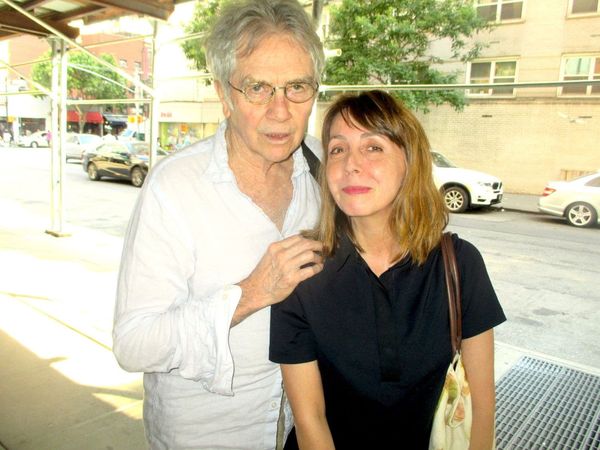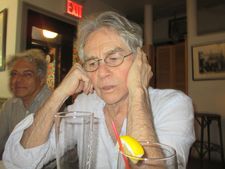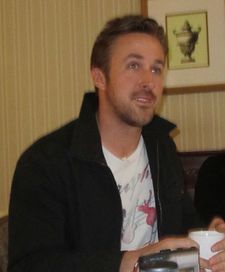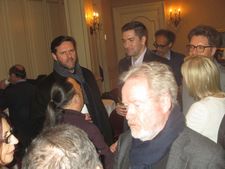 |
| Blade Runner 2049 co-screenwriter Hampton Fancher with Anne-Katrin Titze on Philip K Dick's Do Androids Dream Of Electric Sheep?: "Dreaming is much better than counting." Photo: Michael Almereyda |
Blade Runner 2049, directed by Denis Villeneuve, and Ridley Scott's Blade Runner (1982) have two main common threads - Hampton Fancher as co-screenwriter (with Michael Green and David Webb Peoples respectively) and Harrison Ford as Rick Deckard. Ryan Gosling joins Ford with Ana de Armas, Robin Wright, Sylvia Hoeks, Jared Leto, Edward James Olmos, Lennie James, and Mackenzie Davis, to catapult us 30 more years into the future.
In our conversation at Café Loup in New York on Hampton's birthday, Escapes director Michael Almereyda shared his memories of seeing Blade Runner on opening night in Montana, the year that Steven Spielberg's E.T. - The Extra-Terrestrial took off. Hampton had alternate titles in mind for Blade Runner and says that "dreaming is much better than counting" in his and Philip K Dick's world.
 |
| Hampton Fancher with Michael Almereyda on Blade Runner 2049: "They really made a world much bigger in Budapest." Photo: Anne-Katrin Titze |
Anne-Katrin Titze: I have to ask you about the upcoming Blade Runner 2049. What can you tell me about it?
Hampton Fancher: I know very little about it.
Michael Almereyda: You have story credit and you have co-screenwriting credit. That's a lot.
HF: I wrote a treatment and I wrote a draft of the screenplay that it's based on, I guess. But I haven't seen the film. I can tell from what I've seen, you know the trailers. Those are nice shoes! [to me, distracting from the question, unsuccessfully] I know the director and the producers and we are all very excited. I mean, people are telling me the truth, I think, as they see it. We've all been there before, the fears. There's no fear in this. This apparently is going to be a very good film.
The script itself, the first one I wrote, is definitely, I think, superior to the first one [the original Blade Runner]. And the first one's fine. But there's some things that weren't fine about the first one - don't ask me! - but the second one [Blade Runner 2049] is even finer, as far as I know. But I don't know what happened to it.
AKT: The first Blade Runner - it's funny even to call it that - part of why the look of it is working so well is because it's going forward and backward in time. The style of clothing of the Thirties and Forties inspiring the future. Is that going to be a part of the new one as well?
HF: A bit of that, yeah, for sure. More extreme I think. It better be. It's got to be more. It's got to be the same and different at the same time. And that was accomplished because the director Denis Villeneuve, he surrounded himself … I saw a lot of the work. In preproduction I was looking at the art work. I was looking at the look of the whole thing.
 |
| Nice Guy Ryan Gosling stars in Denis Villeneuve's Blade Runner 2049 Photo: Anne-Katrin Titze |
I wrote things, I expected to see some things but it went way beyond my expectations. It's very real, more real than the first one. It's deeper and wider. The first one was three blocks of set. Literally three streets, cardboard streets, backlot streets. They really made a world much bigger in Budapest.
AKT: Do you remember your first viewing of Blade Runner?
MA: I was in Montana and I saw it opening weekend.
HF: How old were you?
MA: It was '82, so I was 23. I had gone to Montana because I felt I needed to know the West. I'm from the Midwest and I went to high school in California but I didn't know that kind of world. I had seen it [Blade Runner] opening night. And everyone remembers this, it's part of film history, that was the year that E.T. broke all the records and became the most popular and beloved movie of all time and that was the movie that people had an appetite for. The darkness of Blade Runner is something that we've grown into as a culture.
AKT: Growing up from E.T. to Blade Runner?
MA: I think Blade Runner has more of a lasting impact. I mean, I had and have lots of affection for E.T.. But E.T. was such a success and Blade Runner was counted as a failure. And that movie's power has been discovered and re-discovered continually.
And when I met Hampton, I didn't realise until I started asking him - because he is modest about it - how much Blade Runner would not exist without him. It really is Ridley Scott's vision built upon Hampton Fancher's vision. And that's part of what I'm glad our movie [Escapes] displays. There's a winding path...
AKT: The entire Philip K Dick episode [in Escapes that leads to Blade Runner] is fascinating. I had no idea about that.
HF: Neither did I. What is that guy wandering around?
MA: Empedocles. That's from a movie called The Death of Empedocles [directed by Danièle Huillet and Jean-Marie Straub]. It was shot by the same cinematographer who did films with Louis Malle and Godard and did my first movie [Twister] in Kansas - that's how small the world is. A guy named Renato Berta. He is still alive. We did not get along. It was traumatic for both of us. He never made another American film. But he shot The Death Of Empedocles shortly before that. Empedocles was my Dick avatar.
 |
| Blade Runner director Ridley Scott at The Martian 21 Club afternoon tea Photo: Anne-Katrin Titze |
HF: My impression of Dick has a lot to do with that.
AKT: I never thought more about the title before, Do Androids Dream Of Electric Sheep? Isn't the idiom about counting sheep? We don't really dream of sheep.
MA: That's part of Dick's clumsiness. He was constantly doing things like that.
HF: But dreaming is much better than counting.
MA: But it's somewhat muddled.
HF: I do a lot of muddling myself sometimes. So it makes sense to me. Dreaming, you know, that's something that does an inanimate object, so to speak, and a human. Dreaming!
MA: It's a beautiful title.
HF: It's a great title. I fought really hard for that title. I've had shirts made. I lobbied. They wouldn't do it. There were titles in-between.
AKT: How many?
HF: There was Dangerous Days. Mechanismo, that was mine. Animal, that was mine. It got better.
Blade Runner 2049 is scheduled for release in the UK and the US on October 6.
Coming up - Michael Almereyda and Hampton Fancher on Escapes.
Escapes opens in the US on July 26.





















